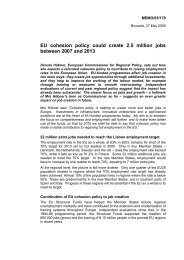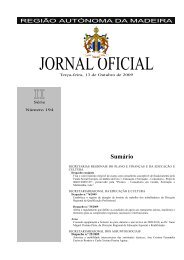Industrial Relations in Europe 2012 - European Commission - Europa
Industrial Relations in Europe 2012 - European Commission - Europa
Industrial Relations in Europe 2012 - European Commission - Europa
You also want an ePaper? Increase the reach of your titles
YUMPU automatically turns print PDFs into web optimized ePapers that Google loves.
subject to austerity measures affect<strong>in</strong>g their global budgetary means, their workforce and/or its<br />
remunerations and that can <strong>in</strong>fluence work<strong>in</strong>g conditions’. The Committee stressed ‘the proven<br />
importance of the public sector <strong>in</strong> general and of the public adm<strong>in</strong>istrations <strong>in</strong> particular, <strong>in</strong> the<br />
present difficult times, to strengthen, monitor and consolidate the susta<strong>in</strong>able recovery of our<br />
economies’. They reaffirmed that ‘what constitutes the adm<strong>in</strong>istrations are the people who work <strong>in</strong><br />
them and that if we don’t place them at the heart, <strong>in</strong> every moment of the transformations we are<br />
go<strong>in</strong>g through, we are certa<strong>in</strong> not to atta<strong>in</strong> the objectives’.<br />
The social partners concluded that: ‘<strong>in</strong> the framework of such transformations, the recognition and<br />
promotion of social dialogue is essential and absolutely necessary, as well as the need to uphold<br />
public sector values of universal access, accountability, transparency, <strong>in</strong>tegrity and equal treatment’.<br />
At national level, there have been wide variations <strong>in</strong> the role played by social dialogue <strong>in</strong><br />
contribut<strong>in</strong>g to the process and implementation of austerity plans. In the 1990s, a period of<br />
economic adjustment dur<strong>in</strong>g the establishment of economic and monetary union, there were<br />
numerous agreements between governments, employers and trade unions on <strong>in</strong>comes, employment<br />
and social security reforms (Baccaro and Lim 2007; Natali and Pochet 2009). It has been noted,<br />
however, that a period of economic crisis on its own is a poor predictor of concerted jo<strong>in</strong>t action.<br />
Specific political and <strong>in</strong>stitutional conditions, especially weak governments and their poor electoral<br />
prospects and the capacity of unions to deliver on their side of the barga<strong>in</strong> are important conditions<br />
<strong>in</strong>fluenc<strong>in</strong>g the establishment of social pacts <strong>in</strong> crisis conditions (Avdagic et al. 2011; Hamann and<br />
Kelly 2007). In the highly turbulent economic and political conditions that have prevailed s<strong>in</strong>ce<br />
2008, there has been no return to the social pacts of the 1990s.<br />
Even <strong>in</strong> countries with established traditions of social dialogue, the severity of the austerity<br />
measures proposed has made it very difficult to develop co-ord<strong>in</strong>ated responses to the crisis.<br />
Governments have often acted <strong>in</strong> haste because of pressure from f<strong>in</strong>ancial markets and felt the<br />
necessity to develop waves of austerity measures, often <strong>in</strong> a reactive way, underm<strong>in</strong><strong>in</strong>g the<br />
confidence of employers and trade unions <strong>in</strong> government action. This is not a conducive context <strong>in</strong><br />
which to pursue agreement with the social partners, s<strong>in</strong>ce it exposes one of the ma<strong>in</strong> limitations of<br />
negotiation and consultation: it requires time, often additional resources to effect change, and<br />
<strong>in</strong>volves compromises. For governments the need to implement austerity measures quickly has<br />
made them more cautious about the value of social dialogue because of the difficulties <strong>in</strong> reach<strong>in</strong>g<br />
agreement on complex and contentious issues <strong>in</strong> a timely manner.<br />
The process of consultation and negotiation has focused on the level of the sector and has been less<br />
dom<strong>in</strong>ated by traditional collective barga<strong>in</strong><strong>in</strong>g over wages, concentrat<strong>in</strong>g on discussions of complex<br />
issues such as pension reform, employment reductions and flexible labour utilisation. In a similar<br />
way to the preced<strong>in</strong>g analysis, it has been more difficult to reach accords <strong>in</strong> countries most affected<br />
by the sovereign debt crisis, especially Greece, Lithuania Portugal, Spa<strong>in</strong> and Romania. Ireland,<br />
however, stands out <strong>in</strong> this regard (and not only <strong>in</strong> relation to our first cluster of countries) because<br />
it has been the only <strong>Europe</strong>an country that has concluded a comprehensive long-term (four-year)<br />
agreement between the public service trade unions and the government, exchang<strong>in</strong>g job cuts for<br />
wage stability, backed up by targets and the monitor<strong>in</strong>g of outcomes. Although this agreement is a<br />
pale imitation of the series of social pacts agreed dur<strong>in</strong>g the 1980s and 1990s, it rema<strong>in</strong>s a very rare<br />
example of a national sectoral level agreement that addresses austerity <strong>in</strong> a relatively <strong>in</strong>clusive<br />
manner and with much less conflict than similarly <strong>in</strong>debted countries (see Box 4.3).This response<br />
has been attributed to the legacy of social partnership which encouraged the search for compromise,<br />
184

















